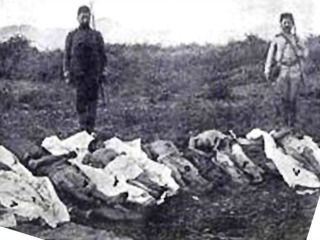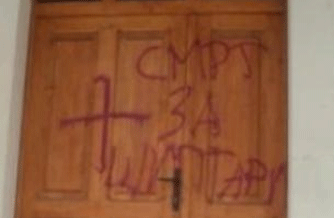|
Ćuška Massacre
The Ćuška massacre (, ) was the killing of 41 Kosovo Albanians, Kosovo Albanian civilians, all men aged 19 to 69, by Serbian security forces, the Yugoslav Army and paramilitaries on 14 May 1999 during the Kosovo War. On 13 March 2010, the Serbian war crimes prosecutor announced that nine men had been arrested for their role in the massacre and stated that a total of 26 men were under investigation for murder and theft at Ćuška. Background Ćuška is a village close to the city of Peja. The village had 200 houses and about 2,000 residents, predominantly Albanians. In the early morning of May 14, 1999, Serbian security forces descended on the small village of Ćuška. Once there the women and children were separated from the men, private property was systematically stolen, and identification papers were destroyed. The forces then divided the men into three groups of about ten and taken into three separate houses, where they were gunned down with automatic weapons. Each of the h ... [...More Info...] [...Related Items...] OR: [Wikipedia] [Google] [Baidu] |
Kosovo
Kosovo, officially the Republic of Kosovo, is a landlocked country in Southeast Europe with International recognition of Kosovo, partial diplomatic recognition. It is bordered by Albania to the southwest, Montenegro to the west, Serbia to the north and east, and North Macedonia to the southeast. It covers an area of and has a population of approximately 1.6 million. Kosovo has a varied terrain, with high plains along with rolling hills and List of mountains in Kosovo, mountains, some of which have an altitude over . Its climate is mainly Continental climate, continental with some Mediterranean climate, Mediterranean and Alpine climate, alpine influences. Kosovo's capital and List of cities and towns in Kosovo#List, most populous city is Pristina; other major cities and urban areas include Prizren, Ferizaj, Gjilan and Peja. Kosovo formed the core territory of the Dardani, an ancient Paleo-Balkanic languages, Paleo-Balkanic people attested in classical sources from the 4th cent ... [...More Info...] [...Related Items...] OR: [Wikipedia] [Google] [Baidu] |
List Of Massacres In Yugoslavia ...
This is a list of massacres in Yugoslavia during the 20th century. Inter-war period (1919–41) * Šahovići massacre * Rugova Massacre *Yugoslav colonization of Kosovo World War II Cold War (1946–1991) * Foibe massacres Croatian War (1991–1995) The Zagreb rocket attacks were one of the many massacres in Croatia.https://www.mgz.hr/en/collections/memorijalni-centar-raketiranja-zagreba-1991_1995,101.html Bosnian War (1992–1995) Kosovo War (1998–1999) Kosovo War aftermath References {{Reflist Yugoslavia Massacres A massacre is an event of killing people who are not engaged in hostilities or are defenseless. It is generally used to describe a targeted killing of civilians en masse by an armed group or person. The word is a loan of a French term for "b ... [...More Info...] [...Related Items...] OR: [Wikipedia] [Google] [Baidu] |
Mass Shootings In Serbia
Mass is an intrinsic property of a body. It was traditionally believed to be related to the quantity of matter in a body, until the discovery of the atom and particle physics. It was found that different atoms and different elementary particles, theoretically with the same amount of matter, have nonetheless different masses. Mass in modern physics has multiple definitions which are conceptually distinct, but physically equivalent. Mass can be experimentally defined as a measure of the body's inertia, meaning the resistance to acceleration (change of velocity) when a net force is applied. The object's mass also determines the strength of its gravitational attraction to other bodies. The SI base unit of mass is the kilogram (kg). In physics, mass is not the same as weight, even though mass is often determined by measuring the object's weight using a spring scale, rather than balance scale comparing it directly with known masses. An object on the Moon would weigh less than it d ... [...More Info...] [...Related Items...] OR: [Wikipedia] [Google] [Baidu] |
May 1999 In Europe
May is the fifth month of the year in the Julian and Gregorian calendars. Its length is 31 days. May is a month of spring in the Northern Hemisphere, and autumn in the Southern Hemisphere. Therefore, May in the Southern Hemisphere is the seasonal equivalent of November in the Northern Hemisphere and vice versa. Late May typically marks the start of the summer vacation season in the United States (Memorial Day) and Canada (Victoria Day) that ends on Labor Day, the first Monday of September. May (in Latin, ''Maius'') was named for the Greek goddess Maia, who was identified with the Roman era goddess of fertility, Bona Dea, whose festival was held in May. Conversely, the Roman poet Ovid provides a second etymology, in which he says that the month of May is named for the ''maiores,'' Latin for "elders", and that the following month (June) is named for the ''iuniores,'' or "young people" (''Fasti VI.88''). Eta Aquariids meteor shower appears in May. It is visible from about A ... [...More Info...] [...Related Items...] OR: [Wikipedia] [Google] [Baidu] |
Anti-Albanian Sentiment
Anti-Albanian sentiment or Albanophobia is discrimination and prejudice towards Albanians as an ethnic group, described primarily in countries with a large Albanian population as immigrants, seen throughout Europe. A similar term used with the same denotation is anti-albanianism used in many sources similarly with albanophobia, although its similarities and/or differences are not defined. The opposite for Albanophobia is Albanophilia. History Albanophobia in the 19th century In 1889, Spiridon Gopčević published an ethnographic study titled ''Old Serbia and Macedonia'' that was a Serbian nationalist book on Kosovo and Macedonia and contained a pro-Serbian ethnographic map of Macedonia. Gopčević's biographer argues that he did not actually go to Kosovo and the study is not based on authentic experiences. Within scholarship, Gopčević's study has been noted for its plagiarisms, manipulations and misrepresentations, especially overstressing the Serbian character of Macedoni ... [...More Info...] [...Related Items...] OR: [Wikipedia] [Google] [Baidu] |
Massacres In The Kosovo War
A massacre is an event of killing people who are not engaged in hostilities or are defenseless. It is generally used to describe a targeted killing of civilians Glossary of French words and expressions in English#En masse, en masse by an armed group or person. The word is a Loanword, loan of a French term for "butchery" or "carnage". Other terms with overlapping scope include war crime, pogrom, mass killing, mass murder, and extrajudicial killing. Etymology ''Massacre'' derives from late 16th century Middle French word ''macacre'' meaning "slaughterhouse" or "butchery". Further origins are dubious, though the word may be related to Latin ''macellum'' "provisions store, butcher shop". The Middle French word ''macecr'' "butchery, carnage" is first recorded in the late 11th century. Its primary use remained the context of animal slaughter (in hunting terminology referring to the head of a stag) well into the 18th century. The use of ''macecre'' "butchery" of the mass killing ... [...More Info...] [...Related Items...] OR: [Wikipedia] [Google] [Baidu] |
1999 In Kosovo
1999 was designated as the International Year of Older Persons. Events January * January 1 – The euro currency is established and the European Central Bank assumes its full powers. * January 3 – The Mars Polar Lander is launched by NASA. * January 25 – The 6.2 Colombia earthquake hits western Colombia, killing at least 1,900 people. February * February 7 – Abdullah II inherits the throne of Jordan, following the death of his father King Hussein. * February 11 – Pluto moves along its eccentric orbit further from the Sun than Neptune. It had been nearer than Neptune since 1979, and will become again in 2231. * February 12 – U.S. President Bill Clinton is acquitted in impeachment proceedings in the United States Senate. * February 16 ** In Uzbekistan, an apparent assassination attempt against President Islam Karimov takes place at government headquarters. ** Across Europe, Kurdish protestors take over embassies and hold hostages after ... [...More Info...] [...Related Items...] OR: [Wikipedia] [Google] [Baidu] |
Law Enforcement In Serbia
The Serbian Police (), formally the Police of the Republic of Serbia (), is the national civilian police force of the Serbia. The Serbian Police are responsible for all local and national law enforcement. It is under the jurisdiction of the Ministry of Internal Affairs. History Serbian Revolution The roots of public security in revolutionary Serbia appear during the Serbian Revolution. At the 1807 Revolutionary Assembly police authority in ''nahijas'' (districts) was entrusted to '' voivodes'' and ''obor knezovi'', and in local communities to local ''knezovi''. The executive officers of the ''obor knezovi'' were represented by ''golaći'' or ''bećari''. Later, the role of executive bodies of the newly established courts was taken over by '' pandurs''. The organization of police authorities in Belgrade and other places was established on 30 December 1807 with regular and permanent police force stationed in Belgrade, which consisted of: police master (manager of the city police), ... [...More Info...] [...Related Items...] OR: [Wikipedia] [Google] [Baidu] |
Serbian War Crimes In The Kosovo War
Serbian may refer to: * Pertaining to Serbia in Southeast Europe; in particular **Serbs, a South Slavic ethnic group native to the Balkans ** Serbian language ** Serbian culture **Demographics of Serbia, includes other ethnic groups within the country *Pertaining to other places **Serbia (other) **Sorbia (other) *Gabe Serbian (1977–2022), American musician See also * * * Sorbs * Old Serbian (other) Old Serbian may refer to: * someone or something related to the Old Serbia, a historical region * Old Serbian language, a general term for the pre-modern variants of Serbian language, including: ** the Serbian recension of Old Church Slavonic la ... {{Disambiguation Language and nationality disambiguation pages ... [...More Info...] [...Related Items...] OR: [Wikipedia] [Google] [Baidu] |
Arson In Europe
Arson is the act of willfully and deliberately setting fire to or charring property. Although the act of arson typically involves buildings, the term can also refer to the intentional burning of other things, such as motor vehicles, watercraft, or forests. The crime is typically classified as a felony, with instances involving risk to human life or property carrying a stricter penalty. Arson that results in death can be further prosecuted as manslaughter or murder. A common motive for arson is to commit insurance fraud. In such cases, a person destroys their own property by burning it and then lies about the cause in order to collect against their insurance policy. Arson is also often committed to conceal another crime, such as murder or burglary. A person who commits arson is referred to as an arsonist, or a serial arsonist if the person has committed arson several times. Arsonists normally use an accelerant (such as gasoline or kerosene) to ignite, propel, and direct fir ... [...More Info...] [...Related Items...] OR: [Wikipedia] [Google] [Baidu] |
Mass Shootings In Kosovo
Mass is an intrinsic property of a body. It was traditionally believed to be related to the quantity of matter in a body, until the discovery of the atom and particle physics. It was found that different atoms and different elementary particles, theoretically with the same amount of matter, have nonetheless different masses. Mass in modern physics has multiple definitions which are conceptually distinct, but physically equivalent. Mass can be experimentally defined as a measure of the body's inertia, meaning the resistance to acceleration (change of velocity) when a net force is applied. The object's mass also determines the strength of its gravitational attraction to other bodies. The SI base unit of mass is the kilogram (kg). In physics, mass is not the same as weight, even though mass is often determined by measuring the object's weight using a spring scale, rather than balance scale comparing it directly with known masses. An object on the Moon would weigh less than it d ... [...More Info...] [...Related Items...] OR: [Wikipedia] [Google] [Baidu] |





